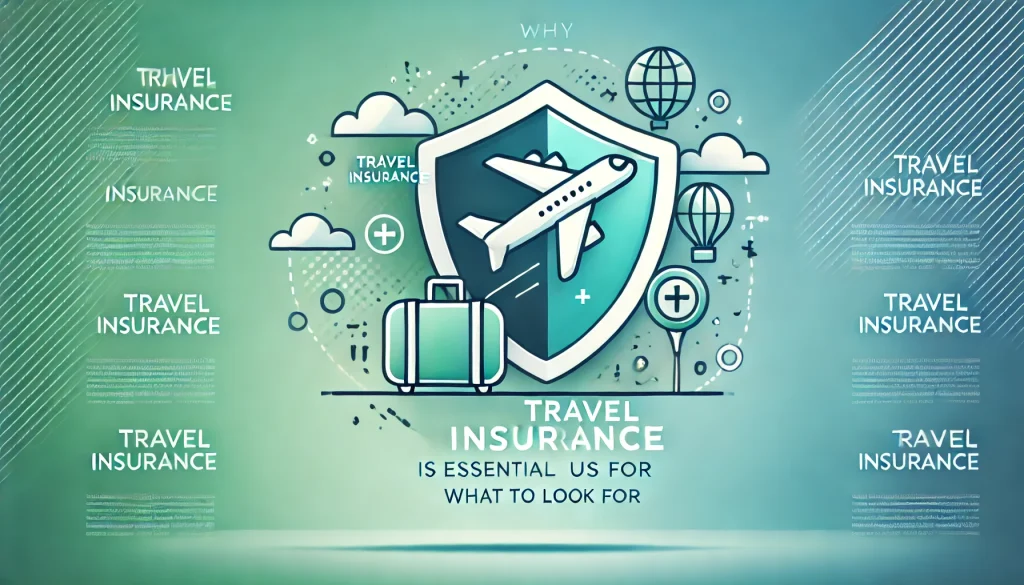Essential Travel Insurance: US Travelers Should Consider

Traveling can be one of the most rewarding experiences, but it also comes with risks. Unforeseen events such as medical emergencies, flight cancellations, or lost luggage can turn a dream vacation into a nightmare. That’s where travel insurance comes in. For US travelers, securing travel insurance is not just an option but a necessity to protect themselves from these unexpected costs.
In this guide, we’ll cover the essential aspects of travel insurance, how to choose the best policy, and why it’s crucial for US travelers to have comprehensive coverage. Additionally, we’ll break down various types of travel insurance policies, their benefits, and how to find the best provider to suit your specific needs.
Table of Contents
What is Travel Insurance?
Travel insurance is a type of insurance designed to cover the costs and losses associated with traveling. It offers protection against risks like trip cancellations, medical emergencies, flight delays, and baggage loss. Depending on the policy, it can also provide assistance in situations such as medical evacuations or covering extra costs from unexpected travel changes.
For US travelers, who might be spending significant sums on both domestic and international trips, travel insurance provides peace of mind. Even though it might seem like an additional expense, it can save you from much larger financial losses.
Why US Travelers Need Travel Insurance
When traveling, especially internationally, US health insurance and other personal policies may not provide coverage. Travel insurance fills the gap by offering protection in various travel-related situations. Here are some key reasons why US travelers should strongly consider getting travel insurance:
1. Medical Emergencies Abroad
Most US health insurance plans, including Medicare, don’t cover medical expenses incurred abroad. Whether it’s an unexpected illness, injury, or a serious medical emergency, treatment costs can quickly skyrocket in foreign countries. Without proper coverage, travelers may find themselves paying tens of thousands of dollars out of pocket for hospitalizations, treatments, or medical evacuations.
2. Trip Cancellations and Interruptions
One of the most common reasons US travelers purchase travel insurance is to protect their trip investment. Unexpected events like severe weather, illness, or personal emergencies can cause you to cancel or cut short your trip. Without insurance, you might lose the entire amount paid for airfare, hotels, or other non-refundable bookings.
3. Lost or Delayed Luggage
Baggage loss or delays are an all-too-common inconvenience for travelers. Insurance can cover the cost of replacing essential items if your luggage is delayed, lost, or stolen during transit. This benefit ensures that you can continue your trip smoothly even if your luggage doesn’t arrive on time.
4. Flight Delays and Cancellations
Air travel is notorious for delays and cancellations. When flights are delayed or canceled, travelers often face extra expenses for meals, hotels, or alternate transportation. Travel insurance can cover these additional costs, allowing you to rebook flights or accommodations without financial stress.
5. Emergency Evacuation and Repatriation
In case of severe illness or injury, travel insurance can cover the cost of emergency medical evacuation to the nearest suitable facility or, in extreme cases, repatriation back to the US. This is particularly important when traveling to remote areas or countries with limited medical infrastructure.
Types of Travel Insurance Coverage
There are several different types of travel insurance policies, each designed to cover specific situations. Here’s a breakdown of the most common types of travel insurance coverage that US travelers should consider:
1. Trip Cancellation and Interruption Insurance
This type of insurance covers the cost of your trip if it is canceled or interrupted for a covered reason, such as illness, injury, natural disasters, or personal emergencies. It reimburses you for non-refundable expenses like airline tickets, hotel reservations, and tours.
2. Travel Medical Insurance
Travel medical insurance covers medical expenses incurred while traveling, particularly abroad. This can include emergency care, hospital stays, medications, and sometimes dental treatment. If you’re traveling outside the US, where your regular health insurance may not provide coverage, travel medical insurance is essential.
3. Medical Evacuation Insurance
Medical evacuation insurance covers the costs associated with transporting you to the nearest medical facility in the event of a serious injury or illness. It may also cover the costs of bringing you back to the US for treatment if necessary. This coverage is critical for travelers visiting remote or underdeveloped areas.
4. Baggage and Personal Belongings Insurance
Baggage insurance covers the loss, theft, or damage of personal belongings during your trip. Some policies also cover delayed baggage, providing reimbursement for essential items until your luggage is returned to you.
5. Flight Delay or Cancellation Insurance
This insurance helps cover additional expenses incurred due to flight delays or cancellations. It can reimburse costs like meals, hotel stays, and alternative transportation if your flight is significantly delayed or canceled.
6. Accidental Death and Dismemberment (AD&D) Insurance
AD&D insurance provides a benefit in the event of an accident resulting in the traveler’s death or dismemberment during their trip. It’s usually included as part of more comprehensive travel insurance policies or can be purchased as a standalone policy.
How to Choose the Best Travel Insurance Policy
Selecting the right travel insurance policy involves more than just picking the cheapest option. You need to find a plan that offers adequate coverage for your unique travel needs. Here’s how to choose the best travel insurance:
1. Evaluate Your Needs
First, determine what type of coverage is essential for your trip. Are you traveling internationally? Will you be engaging in high-risk activities like skiing or scuba diving? Do you have any pre-existing medical conditions? Answering these questions will help you narrow down your insurance options.
2. Compare Policies
Not all travel insurance policies are created equal. Different providers offer varying coverage limits, exclusions, and benefits. Be sure to carefully compare policies, focusing on:
- Coverage limits: Ensure the policy provides sufficient coverage for medical emergencies, trip cancellations, and other potential risks.
- Exclusions: Understand what is not covered under the policy, such as pre-existing conditions or certain high-risk activities.
- Customer service: Check if the provider offers 24/7 customer support and assistance services, especially if you’re traveling abroad.
3. Check the Fine Print
Always read the fine print of the insurance policy. Look for exclusions and limitations that could affect your coverage. For example, some policies may not cover extreme sports, or they may have strict conditions for trip cancellations.
4. Consider Your Destination
Where you’re traveling can significantly impact your insurance needs. If you’re visiting a country with high healthcare costs (like Japan or Switzerland), you’ll need more robust medical coverage. On the other hand, if you’re visiting a remote or developing region, medical evacuation coverage should be a top priority.
5. Look for a Reputable Provider
Choose an insurance provider with a solid reputation and positive customer reviews. Well-known providers often offer more comprehensive plans and better customer service, which can be invaluable in an emergency.
Travel Insurance Providers: How to Choose the Best
When selecting a travel insurance provider, US travelers should consider the following factors:
1. Reputation and Reviews
Choose an insurer with a strong track record for paying claims and providing excellent customer service. Look for online reviews, customer testimonials, and ratings from independent organizations such as AM Best or the Better Business Bureau (BBB).
2. Coverage Options
Some providers offer customizable policies that allow you to select the specific coverage you need. This is especially important if you have unique requirements, such as coverage for pre-existing conditions or high-risk activities.
3. Pricing
While pricing is essential, it’s not the only factor. Make sure the policy offers value for money by providing comprehensive coverage at a reasonable price. Cheap policies may lack crucial benefits, so it’s important to strike a balance between cost and coverage.
4. Ease of Claims Process
Check how the claims process works. Is it easy to file a claim online? How long does it take to process claims? A simple, transparent claims process is a must, especially in the event of an emergency.
When Should You Buy Travel Insurance?
It’s advisable to purchase travel insurance as soon as you’ve booked your trip. This way, you’re protected if you need to cancel or change your travel plans before your departure. Many policies include trip cancellation coverage if purchased within a certain window, typically within 10-14 days of making your initial trip deposit.
Tip: Consider adding “Cancel for Any Reason” (CFAR) coverage to your policy. This add-on allows you to cancel your trip for reasons not covered by standard insurance policies, such as changing your mind about travel or concerns about political instability at your destination.
Common Exclusions in Travel Insurance Policies
While travel insurance provides broad coverage, there are some common exclusions to be aware of:
- Pre-existing medical conditions: Some policies may not cover medical expenses related to pre-existing conditions unless a waiver is purchased.
- High-risk activities: Adventure sports such as skiing, scuba diving, or rock climbing may not be covered under standard policies.
- Pandemics and epidemics: Some policies exclude coverage for travel disruptions related to pandemics like COVID-19, unless specified.
- Acts of war or terrorism: Many policies exclude coverage for losses related to war, political unrest, or terrorism.
Always review the policy details carefully to understand the full scope of coverage and exclusions.
Top Travel Insurance Companies in the US
If you’re looking for reliable travel insurance providers, here are a few highly rated companies in the US:
- Allianz Global Assistance
- Coverage for medical expenses, trip cancellations, lost luggage, and more.
- 24/7 customer service.
- Website: www.allianztravelinsurance.com
- World Nomads
- Excellent for adventure travelers and covering high-risk activities.
- Offers customizable policies for international and domestic trips.
- Website: www.worldnomads.com
- Travelex Insurance Services
- Provides comprehensive coverage for families and business travelers.
- Offers affordable plans for all types of travelers.
- Website: www.travelexinsurance.com
- InsureMyTrip
- A marketplace for comparing travel insurance plans from top providers.
- Offers comprehensive customer support to help you choose the right plan.
- Website: www.insuremytrip.com
Conclusion
Travel insurance is an essential safeguard for US travelers, offering protection against unexpected events that can disrupt your trip. From medical emergencies to trip cancellations, lost luggage, and beyond, a good travel insurance policy provides peace of mind. By understanding the different types of coverage available, evaluating your needs, and choosing the right provider, you can ensure that your next trip is safe, enjoyable, and stress-free.
Before your next adventure, take the time to compare policies, read the fine print, and make sure you’re adequately covered for whatever your journey may bring. Safe travels!


